- Home
- D. H. Lawrence
Complete Works of D.H. Lawrence (Illustrated) Page 15
Complete Works of D.H. Lawrence (Illustrated) Read online
Page 15
When the actors came in, Lettie was moving a vase of flowers. While they played, she sat looking on, smiling, clapping her hands. When it was finished Leslie came and whispered to her, whereon she kissed him unobserved, delighting and exhilarating him more than ever. Then they went out to prepare the next act.
George did not return to her till she called him to help her. Her colour was high in her cheeks.
“How do you know you did not count?” she said nervously, unable to resist the temptation to play this forbidden game. He laughed, and for a moment could not find any reply.
“I do!” he said. “You knew you could have me any day, so you didn’t care.”
“Then we’re behaving in quite the traditional fashion,” she answered with irony.
“But you know,” he said, “you began it. You played with me, and showed me heaps of things — and those mornings — when I was binding corn, and when I was gathering the apples, and when I was finishing the straw-stack — you came then — I can never forget those mornings — things will never be the same — You have awakened my life — I imagine things that I couldn’t have done.”
“Ah! — I am very sorry, I am so sorry.”
“Don’t be! — don’t say so. But what of me?”
“What?” she asked rather startled. He smiled again; he felt the situation, and was a trifle dramatic, though deadly in earnest.
“Well,” said he, “you start me off — then leave me at a loose end. What am I going to do?”
“You are a man,” she replied.
He laughed. “What does that mean?” he said contemptuously.
“You can go on — which way you like,” she answered. “Oh well,” he said, “we’ll see.”
“Don’t you think so?” she asked, rather anxious.
“I don’t know — we’ll see,” he replied.
They went out with some things. In the hall, she turned to him, with a break in her voice, saying, “Oh, I am so sorry — I am so sorry.”
He said, very low and soft, “Never mind — never mind.”
She heard the laughter of those preparing the charade. She drew away and went in the drawing-room, saying aloud:
“Now I think everything is ready — we can sit down now.”
After the actors had played the last charade, Leslie came and claimed her.
“Now, Madam — are you glad to have me back?”
“That I am,” she said. “Don’t leave me again, will you?”
“I won’t,” he replied, drawing her beside him. “I have left my handkerchief in the dining-room,” he continued; and they went out together.
Mother gave me permission for the men to smoke.
“You know,” said Marie to Tom, “I am surprised that a scientist should smoke. Isn’t it a waste of time?”
“Come and light me,” he said.
“Nay,” she replied, “let science light you.”
“Science does — Ah, but science is nothing without a girl to set it going — Yes — Come on — now, don’t burn my precious nose.”
“Poor George!” cried Alice. “Does he want a ministering angel?”
He was half lying in a big arm-chair.
“I do,” he replied. “Come on, be my box of soothing ointment. My matches are all loose.”
“I’ll strike it on my heel, eh? Now, rouse up, or I shall have to sit on your knee to reach you.”
“Poor dear — he shall be luxurious,” and the dauntless girl perched on his knee.
“What if I singe your whiskers — would you send an Armada? Aw — aw — pretty! — You do look sweet — doesn’t he suck prettily?”
“Do you envy me?” he asked, smiling whimsically. “Ra — ther!”
“Shame to debar you,” he said, almost with tenderness. “Smoke with me.”
He offered her the cigarette from his lips. She was surprised, and exceedingly excited by his tender tone. She took the cigarette.
“I’ll make a heifer — like Mrs Daws,” she said.
“Don’t call yourself a cow,” he said.
“Nasty thing — let me go,” she exclaimed.
“No — you fit me — don’t go,” he replied, holding her.
“Then you must have growed. Oh — what great hands — let go. Lettie, come and pinch him.”
“What’s the matter?” asked my sister.
“He won’t let me go.”
“He’ll be tired first,” Lettie answered.
Alice was released, but she did not move. She sat with wrinkled forehead trying his cigarette. She blew out little tiny whiffs of smoke, and thought about it; she sent a small puff down her nostrils, and rubbed her nose.
“It’s not as nice as it looks,” she said.
He laughed at her with masculine indulgence.
“Pretty boy,” she said, stroking his chin.
“Am I?” he murmured languidly.
“Cheek!” she cried, and she boxed his ears. Then “Oh, pore fing!” she said, and kissed him.
She turned round to wink at my mother and at Lettie. She found the latter sitting in the old position with Leslie, two in a chair. He was toying with her arm; holding it and stroking it.
“Isn’t it lovely?” he said, kissing the forearm, “so warm and yet so white. Io — it reminds one of Io.”
“Somebody else talking about heifers,” murmured Alice to George.
“Can you remember,” said Leslie, speaking low, “that man in Merimée who wanted to bite his wife and taste her blood?”
“I do,” said Lettie. “Have you a strain of wild beast too?”
“Perhaps,” he laughed. “I wish these folks had gone. Your hair is all loose in your neck — it looks lovely like that, though — ”
Alice, the mocker, had unbuttoned the cuff of the thick wrist that lay idly on her knee, and had pushed his sleeve a little way.
“Ah!” she said. “What a pretty arm, brown as an over-baked loaf!”
He watched her smiling.
“Hard as a brick,” she added.
“Do you like it?” he drawled.
“No,” she said emphatically, in a tone that meant “yes”. “It makes me feel shivery.” He smiled again.
She superposed her tiny, pale, flower-like hands on his. He lay back looking at them curiously.
“Do you feel as if your hands were full of silver?” she asked almost wistfully, mocking.
“Better than that,” he replied gently.
“And your heart full of gold?” she mocked.
“Of hell!” he replied briefly.
Alice looked at him searchingly.
“And am I like a blue-bottle buzzing in your window to keep you company?” she asked.
He laughed.
“Good-bye,” she said, slipping down and leaving him. “Don’t go,” he said — but too late.
The irruption of Alice into the quiet, sentimental party was like taking a bright light into a sleeping hen-roost. Everybody jumped up and wanted to do something. They cried out for a dance.
“Emily — play a waltz — you won’t mind, will you, George? What! You don’t dance, Tom? Oh, Marie!”
“I don’t mind, Lettie,” protested Marie.
“Dance with me, Alice,” said George, smiling, “and Cyril will take Miss Tempest.”
“Glory! — come on — do or die!” said Alice.
We began to dance. I saw Lettie watching, and I looked round. George was waltzing with Alice, dancing passably, laughing at her remarks. Lettie was not listening to what her lover was saying to her; she was watching the laughing pair. At the end she went to George.
“Why!” she said, “you can —
“Did you think I couldn’t?” he said. “You are pledged for a minuet and a valeta with me — you remember?”
“Yes.”
“You promise?”
“Yes. But —
“I went to Nottingham and learned.”
“Why — because? — Very well, Leslie, a mazurka. Will you play it
, Emily — Yes, it is quite easy. Tom, you look quite happy talking to the Mater.”
We danced the mazurka with the same partners. He did it better than I expected — without much awkwardness — but stiffly. However, he moved quietly through the dance, laughing and talking abstractedly all the time with Alice.
Then Lettie cried a change of partners, and they took their valeta. There was a little triumph in his smile.
“Do you congratulate me?” he said.
“I am surprised,” she answered.
“So am I. But I congratulate myself.”
“Do you? Well, so do I.”
“Thanks! You’re beginning at last.”
“What?” she asked.
“To believe in me.”
“Don’t begin to talk again,” she pleaded sadly, “nothing vital.”
“Do you like dancing with me?” he asked
“Now, be quiet — that’s real,” she replied.
“By Heaven, Lettie, you make me laugh!”
“Do I?” she said — ”What if you married Alice — soon.”
“I — Alice! — Lettie!! Besides, I’ve only a hundred pounds in the world, and no prospects whatever. That’s why — well — I shan’t marry anybody — unless it’s somebody with money.”
“I’ve a couple of thousand or so of my own — ”
“Have you? It would have done nicely,” he said, smiling. “You are different tonight,” she said, leaning on him.
“Am I?” he replied — ”It’s because things are altered too. They’re settled one way now — for the present at least.”
“Don’t forget the two steps this time,” said she, smiling, and adding seriously, “You see, I couldn’t help it.”
“No, why not?”
“Things! I have been brought up to expect it — everybody expected it — and you’re bound to do what people expect you to do — you can’t help it. We can’t help ourselves, we’re all chess-men,” she said.
“Ay,” he agreed, but doubtfully.
“I wonder where it will end,” she said.
“Lettie!” he cried, and his hand closed in a grip on hers.
“Don’t — don’t say anything — it’s no good now, it’s too late. It’s done; and what is done, is done. If you talk any more, I shall say I’m tired and stop the dance. Don’t say another word.”
He did not — at least to her. Their dance came to an end. Then he took Marie, who talked winsomely to him. As he waltzed with Marie he regained his animated spirits. He was very lively the rest of the evening, quite astonishing and reckless. At supper he ate everything, and drank much wine.
“Have some more turkey, Mr Saxton.”
“Thanks — but give me some of that stuff in brown jelly, will you? It’s new to me.”
“Have some of this trifle, Georgie?”
“I will — you are a jewel.”
“So will you be — a yellow topaz tomorrow!”
“Ah! tomorrow’s tomorrow!”
After supper was over, Alice cried:
“Georgie, dear — have you finished? — don’t die the death of a king — King John — I can’t spare you, pet.”
“Are you so fond of me?”
“I am — Aw! I’d throw my best Sunday hat under a milk-cart for you, I would!”
“No; throw yourself into the milk-cart — some Sunday, when I’m driving.”
“Yes — come and see us,” said Emily.
“How nice! Tomorrow you won’t want me, Georgie dear, so I’ll come. Don’t you wish Pa would make Tono-Bungay? Wouldn’t you marry me then?”
“I would,” said he.
When the cart came, and Alice, Madie, Tom and Will departed, Alice bade Lettie a long farewell — blew Georgie many kisses — promised to love him faithful and true — and was gone.
George and Emily lingered a short time.
Now the room seemed empty and quiet, and all the laughter seemed to have gone. The conversation dribbled away; there was an awkwardness.
“Well,” said George heavily, at last. “Today is nearly gone — it will soon be tomorrow. I feel a bit drunk! We had a good time tonight.”
“I am glad,” said Lettie.
They put on their clogs and leggings, and wrapped themselves up, and stood in the hall.
“We must go,” said George, “before the clock strikes — like Cinderella — look at my glass slippers — ” he pointed to his clogs. “Midnight, and rags, and fleeing. Very appropriate. I shall call myself Cinderella who wouldn’t fit. I believe I’m a bit drunk — the world looks funny.”
We looked out at the haunting wanness of the hills beyond Nethermere. “Good-bye, Lettie; good-bye.”
They were out in the snow, which peered pale and eerily from the depths of the black wood.
“Good-bye,” he called out of the darkness. Leslie slammed the door, and drew Lettie away into the drawing-room. The sound of his low, vibrating satisfaction reached us, as he murmured to her, and laughed now. Then he kicked the door of the room shut. Lettie began to laugh and mock and talk in a high strained voice. The sound of their laughter mingled was strange and incongruous. Then her voice died down.
Marie sat at the little piano — which was put in the dining-room — strumming and tinkling the false, quavering old notes. It was a depressing jingling in the deserted remains of the feast, but she felt sentimental, and enjoyed it.
This was a gap between today and tomorrow, a dreary gap, where one sat and looked at the dreary comedy of yesterdays, and the grey tragedies of dawning tomorrows, vacantly, missing the poignancy of an actual today.
The cart returned.
“Leslie, Leslie, John is here, come along!” called Marie. There was no answer.
“Leslie — John is waiting in the snow.”
“All right.”
“But you must come at once.” She went to the door and spoke to him. Then he came out looking rather sheepish, and rather angry at the interruption. Lettie followed, tidying her hair. She did not laugh and look confused, as most girls do on similar occasions; she seemed very tired.
At last Leslie tore himself away, and after more returns for a farewell kiss, mounted the carriage, which stood in a pool of yellow light, blurred and splotched with shadows, and drove away, calling something about tomorrow.
PART TWO
CHAPTER I
STRANGE BLOSSOMS AND STRANGE NEW BUDDING
Winter lay a long time prostrate on the earth. The men in the mines of Tempest, Warrall and Co. came out on strike on a question of the rearranging of the working system down below. The distress was not awful, for the men were on the whole wise and well-conditioned, but there was a dejection over the face of the country-side, and some suffered keenly. Everywhere, along the lanes and in the streets, loitered gangs of men, unoccupied and spiritless. Week after week went on, and the agents of the Miners’ Union held great meetings, and the ministers held prayer-meetings, but the strike continued. There was no rest. Always the crier’s bell was ringing in the street; always the servants of the company were delivering handbills, stating the case clearly, and always the people talked and filled the months with bitter, and then hopeless, resenting. Schools gave breakfasts, chapels gave soup, well-to-do people gave teas — the children enjoyed it. But we, who knew the faces of the old men and the privations of the women, breathed a cold, disheartening atmosphere of sorrow and trouble.
Determined poaching was carried on in the squire’s woods and warrens. Annable defended his game heroically. One man was at home with a leg supposed to be wounded by a fall on the slippery roads — but really, by a man-trap in the woods. Then Annable caught two men, and they were sentenced to two months’ imprisonment.
On both the lodge gates of Highclose — on our side and on the far Eberwich side — were posted notices that trespassers on the drive or in the grounds would be liable to punishment. These posters were soon mudded over, and fresh ones fixed.
The men loitering on the road by Nethermere looked a
ngrily at Lettie as she passed, in her black furs which Leslie had given her, and their remarks were pungent. She heard them, and they burned in her heart. From my mother she inherited democratic views, which she now proceeded to debate warmly with her lover.
Then she tried to talk to Leslie about the strike. He heard her with mild superiority, smiled, and said she did not know. Women jumped to conclusions at the first touch of feeling; men must look at a thing all round, then make a decision — nothing hasty and impetuous — careful, long-thought-out, correct decisions. Women could not be expected to understand these things, business was not for them; in fact, their mission was above business — etc. etc. Unfortunately Lettie was the wrong woman to treat thus.
“So!” said she, with a quiet, hopeless tone of finality.
“There now, you understand, don’t you, Minnehaha, my Laughing Water. — So laugh again, darling, and don’t worry about these things. We will not talk about them any more, eh?”
“No more.”
“No more — that’s right — you are as wise as an angel. Come here — pooh, the wood is thick and lonely! Look, there is nobody in the world but us, and you are my heaven and earth!”
“And hell?”
“Ah — if you are so cold — how cold you are! — it gives me little shivers when you look so — and I am always hot — Lettie!”
“Well?”
“You are cruel! Kiss me — now — No, I don’t want your cheek — kiss me yourself. Why don’t you say something?”
“What for? What’s the use of saying anything when there’s nothing immediate to say?”
“You are offended!”
“It feels like snow today,” she answered.
At last, however, winter began to gather her limbs, to rise, and drift with saddened garments northward.
The strike was over. The men had compromised. It was a gentle way of telling them they were beaten. But the strike was over.
The birds fluttered and dashed; the catkins on the hazel loosened their winter rigidity, and swung soft tassels. All through the day sounded long, sweet whistlings from the bushes; then later, loud, laughing shouts of bird triumph on every hand.
I remember a day when the breast of the hills was heaving in a last quick waking sigh, and the blue eyes of the waters opened bright. Across the infinite skies of March great rounded masses of cloud had sailed stately all day, domed with white radiance, softened with faint, fleeting shadows as if companies of angels were gently sweeping past; adorned with resting, silken shadows likes those of a full white breast. All day the clouds had moved on to their vast destination, and I had clung to the earth yearning and impatient. I took a brush and tried to paint them, then I raged at myself. I wished that in all the wild valley where cloud shadows were travelling like pilgrims, something would call me forth from my rooted loneliness. Through all the grandeur of the white and blue day, the poised cloud masses swung their slow flight, and left me unnoticed.

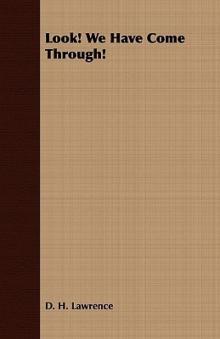 Look! We Have Come Through!
Look! We Have Come Through!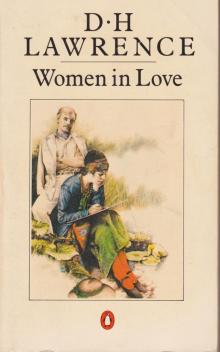 Women in Love
Women in Love The Ladybird
The Ladybird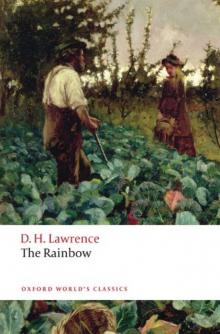 The Rainbow
The Rainbow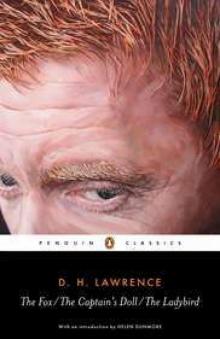 The Captain's Dol
The Captain's Dol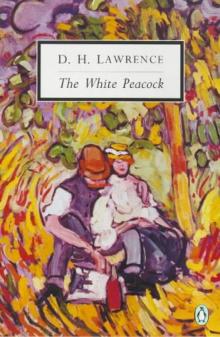 The White Peacock
The White Peacock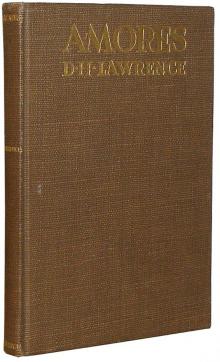 Amores
Amores Lady Chatterley's Lover
Lady Chatterley's Lover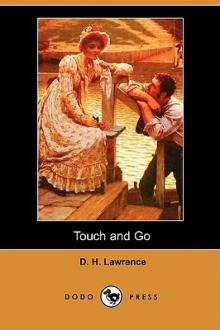 Touch and Go
Touch and Go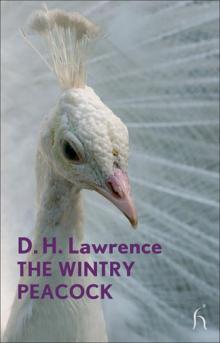 The Wintry Peacock
The Wintry Peacock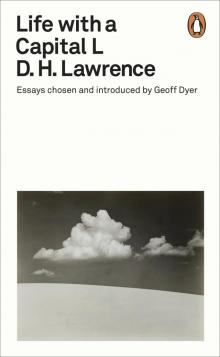 Life with a Capital L
Life with a Capital L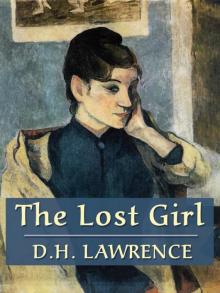 The Lost Girl
The Lost Girl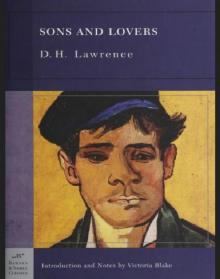 Sons and Lovers
Sons and Lovers England, My England
England, My England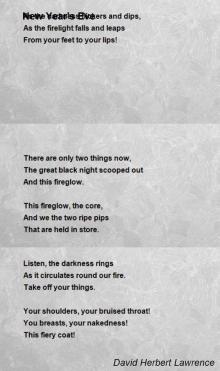 New Poems
New Poems Twilight in Italy
Twilight in Italy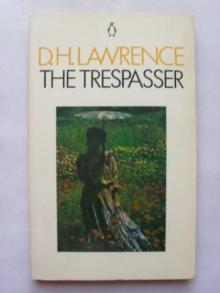 The Trespasser
The Trespasser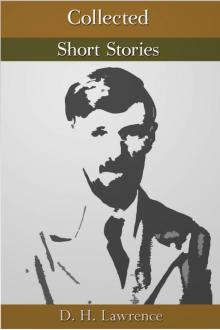 The Collected Short Stories
The Collected Short Stories The First Lady Chatterley's Lover
The First Lady Chatterley's Lover Kangaroo
Kangaroo Bay
Bay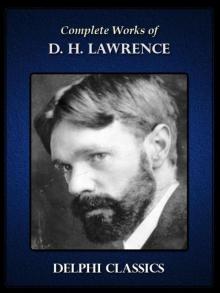 Complete Works of D.H. Lawrence
Complete Works of D.H. Lawrence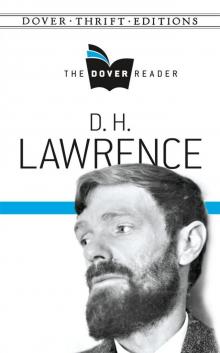 D H Lawrence- The Dover Reader
D H Lawrence- The Dover Reader The Rainbow (100th Anniversary ed.)
The Rainbow (100th Anniversary ed.)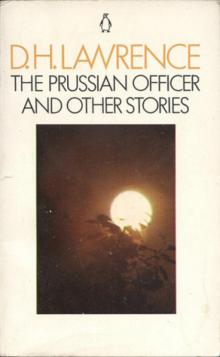 The Prussian Officer
The Prussian Officer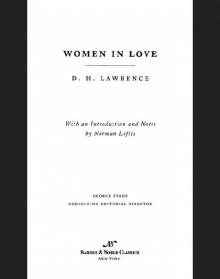 Women in Love (Barnes & Noble Classics Series)
Women in Love (Barnes & Noble Classics Series) John Thomas and Lady Jane
John Thomas and Lady Jane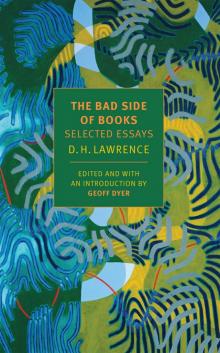 The Bad Side of Books
The Bad Side of Books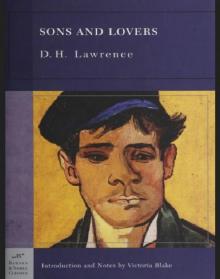 Sons and Lovers (Barnes & Noble Classics Series)
Sons and Lovers (Barnes & Noble Classics Series) Selected Stories
Selected Stories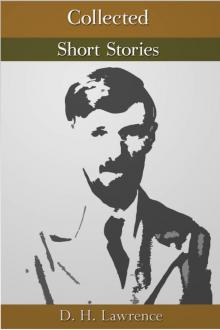 Collected Short Stories
Collected Short Stories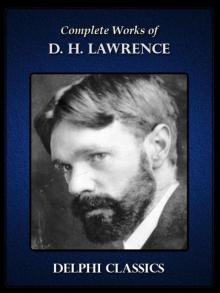 Complete Works of D.H. Lawrence (Illustrated)
Complete Works of D.H. Lawrence (Illustrated)